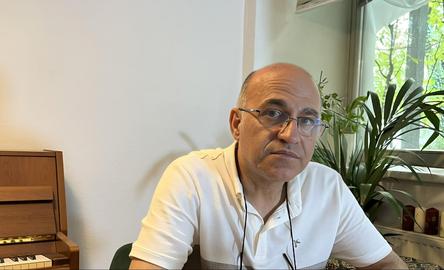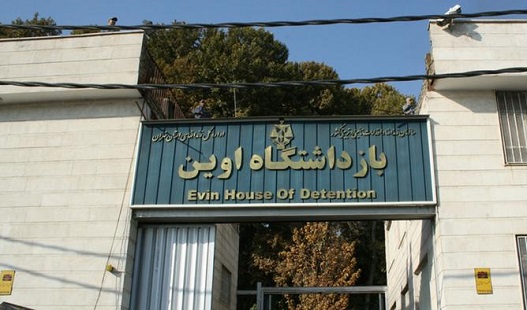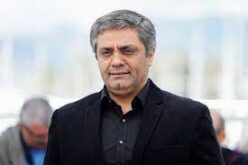Iranwire – On June 2, Austria’s government announced the release of Kamran Ghaderi, a dual Iranian-Austrian citizen, from Tehran’s Evin prison.

The businessman was arrested at Tehran International Airport in December 2015 on charges of committing “actions against national security” and “collaboration with a hostile government,” in what European governments and human rights activists viewed as a clear instance of hostage-taking by the Islamic Republic.
Following his return to Austria, Ghaderi shared with IranWire his experience of the events that unfolded during his more than seven years of captivity.
A Photo with the Austrian President
The interview started with a photograph showing Ghaderi standing alongside Heinz Fischer, the former president of Austria, in Tehran.
When asked about the emotions evoked by this picture, Ghaderi broke into laughter and said: “This photo is from a period when I thought I could contribute to Iran’s culture or economy, even modestly.”
“This photo dates back to 2014, a year when Mr. Heinz Fischer traveled to Iran accompanied by a substantial economic delegation. I was a member of this delegation and I believe this picture was taken a few months before my arrest.”
“Throughout this voyage, we succeeded in formalizing a memorandum of understanding with an Iranian research institution, with the goal of establishing a private university in collaboration with Austrian faculties and research centers.”
Ghaderi said that Fischer stood as one of the rare political figures in Austria who extended their support to him while he was confined in Evin prison.
“I aspire to one day express my gratitude to him,” he said. “He personally penned two direct communications to the Iranian authorities and held meetings with my wife.”
“I Hope to Understand the Reasons behind my Arrest One Day”
Asked about the possible reasons for his arrest and seven and a half years of imprisonment, Ghaderi said: “I still do not know why I was arrested. I had ample time to think about every conceivable facet. Did my Kurdish heritage pose a problem for the authorities? Did I occasionally express my opposition to certain Iranian policies? I even thought about whether my choice of wearing a tie could have inadvertently triggered my arrest.”
“Amidst these considerations, the notion often crossed my mind that maybe I wanted to step into a place which, according to some institutions or individuals within the Iranian government, was not for me.”
“It didn’t only have banking projects in Iran,” He continued. “I was trying to establish the necessary infrastructure and resources for expediting the development of IBM’s software in the country after the lifting of sanctions. I thought that perhaps some people harbored reservations about such projects in Iran or viewed me as a serious threat to their activities.”
“I Was Arrested Immediately Upon my Arrival at Tehran Airport”
Ghaderi said he was arrested immediately upon landing at Tehran Airport in December 2015 as he embarked on a business trip.
“The charges levied against me included actions deemed detrimental to national security and alleged collaboration with a hostile government,” he said.
When asked whether he endured physical torture during his interrogations, Ghaderi said that “physical torture is not limited to beatings or whippings.”
“Confinement in small cells, being subjected to 24 hours of light, sleep deprivation, and sleeping on the cold floor with a military blanket, all led me to the point where I needed to undergo a spinal operation. I can’t sit for more than 20 minutes now and bending beyond 20 degrees has become an insurmountable challenge.”
“Last week, I consulted a specialist physician who informed me that nothing can be done and that the slightest misstep could result in paralysis.”
“I Realized I Was Married to a Lioness”
Speaking about his first contact with his spouse while in custody, he recounted, “I endured solitary confinement for three months. The day after my arrest, I was informed I had the privilege to dial one single number inside Iran.”
“However, stringent restrictions were imposed: I couldn’t divulge my arrest or location; I could only say I was alive and not not to worry.”
“After three or four weeks, I was granted permission to speak on the phone for only five minutes. The night before I had prepared my testament to read to my wife.”
“It was at that moment that I realized I was married to a lioness. I’m happy to have given her such a nickname and now many people know Harika by this nickname. There was no crying. She was surprised that I called, but I felt that she was ready to hear my voice. I was granted five minutes to read my testament.”
“We Taught and Studied in Prison”
After three months of solitary confinement, Ghaderi spent approximately a year and a half in Ward 209 of Evin prison, where he witnessed the “resilience and optimism” of inmates.
“I conceived a multifaceted schedule for myself. I regarded it as my daily duty to engage in structured activities.”
“Waking up no later than six a.m. became a habit. Incorporating walks into my routine, as I was unable to engage in rigorous exercise, and studying constituted pivotal aspects of my regimen. Studying, teaching and writing books were integral components of my program.”
Ghaderi said he translated an Iranian tale into German and collected 7,000 Persian proverbs and idiomatic expressions in 15 notebooks.
“I was dedicated to participating in classes. Our dear friend Manouchehr taught French, and Kamal, another cherished comrade and a former employee of Iran’s Ministry of Foreign Affairs, gave lessons in Spanish. I personally taught German to some young individuals.”
“I had Anticipated Greater Support from the Austrian Government”
Regarding the measures taken by the Austrian authorities during his incarceration, Ghaderi said: “Undoubtedly, the Austrian government fell short of my expectations, yet I hesitate to proclaim they were inactive. My anticipation level, whether justifiably or otherwise, led me to hope for a more proactive involvement on their part.”
Ghaderi said that he is aware his dual citizenship might have limited the Austrian government’s capacity to provide extensive support, but he thought the Austrian embassy in Tehran could have tried to establish contact with him.
“I understand the Austrian ambassador’s endeavor to foster harmonious ties between nations and governments. It’s a commendable aspiration. Yet, amid all the commendations he bestowed upon Iran, he could have appealed for my release.”
“Meeting my Children after So Many Years was Shocking”
After years of absence, Ghaderi returned to his home country. I asked him how he perceives his transformation during all these years.
“In my opinion, stagnation in personal evolution equates to a life unlived. Among my most significant accomplishments is my newfound reverence for my family. Undoubtedly, my wife, Harika, holds a place of heightened significance within my heart.”
“An acute sense of present-mindedness is another consequence of my incarceration.”
Ghadri recounted the moment when he saw his three children again after seven and a half years: “It took time to come out of shock.”
The Cultural Elites Are in Prison
Ghaderi said he was incarcerated with “individuals who were not incarcerated for their actions, but rather due to their religious convictions, personal beliefs and ideologies.”
“Regrettably, I didn’t have the chance to meet women, those women who spearheaded the [protest] movement. Nevertheless, I encountered sincere men, resolute men who held steadfast to their principles,” he continued.
“Above all, I encountered men of vision and aspiration. From those I met in prison, I perceive a promising horizon for Iran’s future. I take great satisfaction in having lived alongside them and gleaned invaluable insights. It dawned on me that the Iranian populace embodies intellect, discernment and culture, and that the very cream of this erudite society resides behind prison walls.”
As he concluded the interview, Ghadrri expressed hope that both media outlets and social advocates, both within and beyond Iran’s borders, will focus their energies on aiding this segment of Iranian society ensnared within prison walls.
“I request you to channel your efforts toward those incarcerated in our nation. Beyond Iran’s borders, we must elucidate the plight of these individuals to the politicians who hold the capacity to offer assistance.”
“From the Sharif University of Technology scholars who were my companions in class to the prisoners of conscience, the dervishes, the labor union activists, teachers, and the individuals with dual citizenship – these are the souls deserving our concentrated attention.”
 Shabtabnews In this dark night, I have lost my way – Arise from a corner, oh you the star of guidance.
Shabtabnews In this dark night, I have lost my way – Arise from a corner, oh you the star of guidance.



